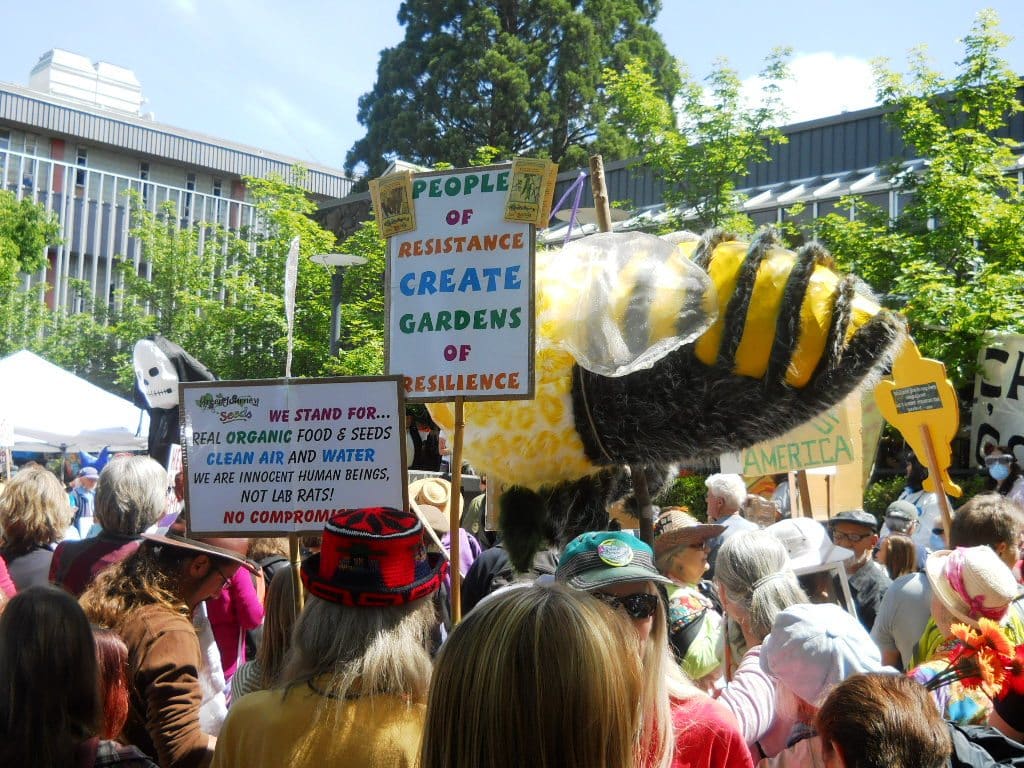Above: 2013 Monsanto protest in Wayne Morse Free Speech Plaza
“The will of the people is the only legitimate foundation of any government, and to
protect its free expression should be our first object.”– Thomas Jefferson
(inscribed at Wayne Morse Free Speech Plaza)
Last Friday the Civil Liberties Defense Center filed a motion challenging the 11:00 p.m.
– 6:00 a.m. curfew rule at Wayne Morse Free Speech Plaza. The motion was filed on
behalf of Eric Jackson, a well known local advocate for the houseless.
Mr. Jackson was arrested at the Free Speech Plaza earlier this year when he was
protesting the apparent criminalization of homelessness by City and County authorities.
He was also protesting the curfew at the Plaza. Mr. Jackson was charged with criminal
trespass in the second degree for his alleged presence at the Plaza in violation of the
curfew.
The “demurrer” filed by the CLDC is the first challenge to the constitutionality of the
curfew at the Free Speech Plaza since the current form of the curfew was instituted in
September 2013. While the Plaza was formerly home to countless nighttime vigils and
protests of all kinds, since the curfew was instituted, local people have stopped engaging
in nighttime protests for fear of arrest. Mr. Jackson has not shied away from risking
arrest to advance the rights of the most economically disenfranchised.
This is not the first time the CLDC has challenged attempts by Lane County and the City
of Eugene to foreclose free speech activity at the Plaza. As the CLDC’s recent court filing
recounts, previous attempts by the city and county to shut down free speech at the Plaza
have, with few exceptions, been deemed unconstitutional by the local courts.
In August of 2013, CLDC filed a constitutional challenge that resulted in Alley Valkyrie
and with several other activists’ acquittal for violating a closure order of the Plaza after
the Eugene Municipal Court found that “[e]ven under the least strict analysis, the fiveday
closure…was unconstitutional.”
Later in August, in response to another constitutional challenge brought by the CLDC,
the Court ordered the dismissal of trespassing charges against 15 other protestors
arrested for violating a previous form of the curfew. In the order, the court noted that
“enforcement of a curfew which closes the very area that the County designated ‘Free
Speech Plaza’ (much of which is barely distinguishable from a sidewalk) for a third of
every day significantly limited Defendants’ right to speech and assembly, regardless of
the curfew’s intent.”
Despite the court’s rulings, the City and County continue to arrest and threaten people
with arrest if they intend to protest at the Free Speech Plaza between 11:00 p.m. and
6:00 a.m. Further, the County has continued its attempts to enclose public space by
instituting identical curfews for the areas adjacent to the Free Speech Plaza and has
suggested further enclosing the area available to people to stand or sit on public
sidewalks.
The City of Eugene also recently passed a law giving private property owners the right to
trespass people from public right of ways—publicly owned lands that are between
sidewalks and roads—a clear continuation of the City’s criminalization of homeless
people in Eugene. The areas subject to the new law are generally considered traditional
public fora and, therefore, open to the public to engage in First Amendment activity. In
passing the new law, City councilors stated that the new law would not restrict peaceful
assemblies. However, it is still too early to determine whether law enforcement will
attempt to use this law to limit assembly, particularly assembly that involves the use of
tents as a form of expression.
While the City and County claim that the curfew rule is intended to prevent the side
effect of “camping,” the CLDC argues that a curfew at the Free Speech Plaza is not a
constitutional method of regulating these alleged side effects and those side effects are
already prohibited and vigorously enforced by other laws.
In the demurrer on behalf of Mr. Jackson, the CLDC argued that “the City fails to grasp
that it is not protest or other expressive activity that leads to the harms sought to be
prevented [by the City/County]. Rather, it is a lack of housing and shelter, systemic
economic and social inequality, lack of available health care, rising housing costs, lack of
bathrooms and trash receptacles, and City and County policies regarding the unhoused
that lead to camping and the associated “harms.”
A trial date for Mr. Jackson has not been set.

